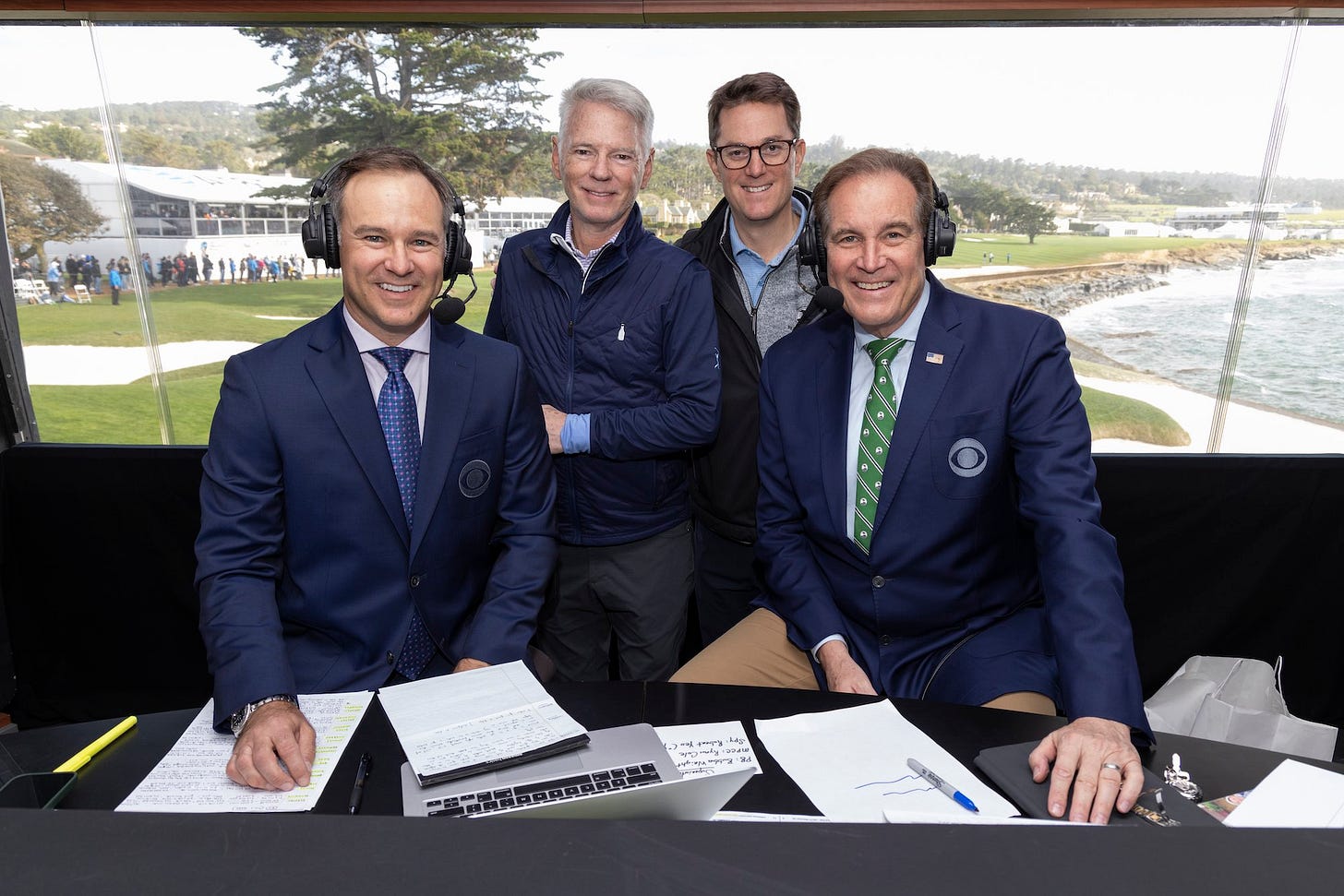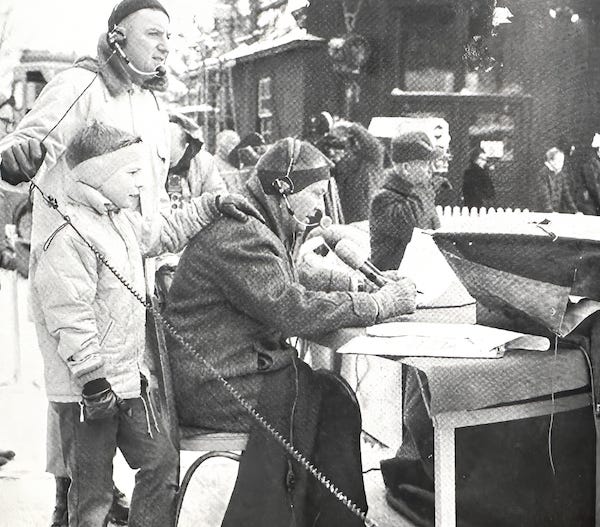Quad Questions: Sean McManus
The retiring CBS Sports Chairman discusses the state of golf television, his proudest accomplishments, Jim McKay, and what it was like to be with his father during the Munich hostage tragedy.
Sean McManus is retiring as Chairman of CBS Sports following the 2024 Masters. He just oversaw his ninth Super Bowl as part of his lead role at CBS Sports dating to 1996. The Chiefs-49ers overtime thrillers was confirmed Monday as the second most-watched television event in American history.
McManus’s career began as a 12-year-old production assistant at the Jacksonville Open. He made $25 cash. As the son of legendary broadcaster Jim McKay, McManus knew at an early age he wanted to work in television. Now 68, his career has spanned the earliest days of sports television working as an assistant under legends of the business before eventually overseeing multiple renewals of the biggest deals in sports involving the NFL, Masters and NCAA men’s basketball tournament. He’s overseen creative decisions for a network that has been the longtime home of the Masters, PGA Championship and PGA Tour. McManus also led CBS News for six years and now turns the Sports keys over to longtime lieutenant David Berson.
In this edition of Quad Questions, McManus discusses the state of golf television at CBS and what it was like to be with his father during the Munich Olympics Because I kept asking and the longtime executive kept answering, there are several bonus questions for subscribers where McManus expands on the influence of his father, his all-time best lead golf announce duos, the glory days of ABC golf coverage, and whether he ever considered revitalizing the iconic theme music.
GS: What CBS golf accomplishment are you especially proud of?
SM: My biggest source of pride is the quality of our golf coverage and how it continues to get better and better. I didn't put Jim Nantz in the 18th tower. That was done before I got here. But I think he is the quintessential golf host. I would put him right next to—and obviously I'm not objective about this—but I would put him right next to Jim McKay as one and two, and you can decide who's one and who is two. I feel really good about the fact that I hired Nick Faldo who was the right guy at the right time. And then when Nick decided to retire, I'm really proud of the fact that we hired Trevor Immelman to be only the fifth lead analyst since the 1950s. Proud of Dottie Pepper. Proud of Frank Nobilo and all of our other announcers. So I would say my biggest accomplishment is helping to get CBS sports golf coverage where it is today. And then from a business standpoint, I've done several PGA Tour deals and a number of PGA Championship deals. They’ve all been really important for us. And there’s our ongoing relationship with Augusta National, which I'm very, very proud of. I think the way we've elevated the PGA Tour, the Masters and the PGA Championship is a credit to how important golf is to CBS Sports.
GS: CBS has invested heavily in recent years to upgrade the golf coverage at a time the economic model for golf tournament coverage and sponsorship is changing. Does the model still work and should it be something of importance to protect for pro golf’s media partners?
SM: The system is working very well right now. The sponsors are getting their value. I know the purses are going up, and I know there's a lot of different forces in the world of golf right now, but I am confident that the PGA Tour is going to continue to thrive. Whatever happens in the golf landscape, I think the tour is going to figure out a way to come out on top and to continue to thrive as it has been. There are a lot of moving pieces right now, but I only worry about things I can control. And I have some control over the quality of the broadcast this weekend and in future weekends. I’ll let the PGA Tour and the other participants figure out what deal makes sense for everybody and we’ll just continue to do the best shows we possibly can. But there are always ups and downs in any progression of a sports league and the strong leagues survive. In the end, they're going to reach an accommodation with whomever is necessary and the PGA Tour will continue to thrive.
GS: All golf telecasts have gotten longer and core golf fans expect to see every shot live yet the broadcast also needs to appeal to a wider audience. And sponsors still care about ratings. So is there a place in golf television for something closer to what we used to see: a shorter broadcast that starts closer to the back nine with more mainstream elements supported by a secondary feed showing all the shots to core fans? Or has that ship sailed?
SM: I don’t know if it would be tighter just because it was shorter. The foundation of the PGA Tour television package is the sponsor underpinning. And as long as the sponsor underpinning is still there, I think you'll see three hour broadcast windows for the vast majority of the PGA Tour events. The system works pretty well. I am certainly sensitive to the fact that many people think there are too many commercials in our golf broadcasts. We've tried to mitigate that by the double box where you see the live shots in conjunction and simultaneously with the commercials we’ve tried to cut down with the assistance of the PGA Tour cut down dramatically, all the other elements. A lot of the sales elements have gone and a lot of the sponsor elements have been formulated in a way that isn’t so impactful on the viewer.
GS: You were in Munich as a 17-year-old when terrorists kidnapped and killed 11 Israelis. Your father was the Olympics host but was forced into the role of newsman over several hours. What was that moment like?
SM: I was in the studio right next to my father for the duration. You have to remember that in those days, terrorism was not part of our vernacular. It just wasn’t something that happened. And the fact that it was involving innocent athletes was a horrific story. There were no cable news networks. No CNN, no MSNBC, no Fox News. There was no social media and no Internet. And none of us understood the impact that the ABC broadcast, and my father specifically, was having in America. Or that the entire nation was waiting to see what happened to these poor athletes. The only way they could find out was through ABC Sports which was functioning as a news organization.
He was in the chair for over 12 hours with conflicting reports coming and going. One report had all the hostages freed, and my dad and Roone Arledge said, “we're not going to go with any news reports unless we have two verifiable resources.” So it was the ultimate grace-under-pressure moment my father was going through and it was both draining and emotional for him. But he did an amazing job. And in some ways it was the defining moment of his career. Something which was always a source of conflict for him because as well as he acted and as responsible as he was, and even with all of the praise he got, it was during maybe the worst moment in the history of sports. The fact that he was so closely associated with that was positive in that he did such an amazingly good job, but obviously it was traumatic in just having to follow those horrible occurrences.
I remember when we got back home he took a vacation afterwards. I came back the day after the Israeli hostage crisis, but when he got back, there were probably two or three large duffel bags of mail that people had written to ABC in care of Jim McKay. Hundreds and hundreds of letters talking about how his compassion, his sensitivity and his reporting was something that the letter writer would never forget. And for the rest of his career when people came up to him and said, “I'm a big fan of yours,” about 90% of the time they would say, “I'll never forget what you did during the Munich hostage crisis.” And when people come up to me and say, “I have great admiration for your dad,” they bring up Munich. It was one of the best ever performances under intense pressure in live television. And when he said, with great emotion, “they're all gone,” I think those words are right up there with Walter Cronkite announcing the death of John F. Kennedy. I think those are words that will live on forever and were more impactful than you can possibly imagine.
He was my idol before that, but he was my super idol after that. It brought both of us a lot closer together. After they signed off I rode home with him in the car at four o'clock in the morning. We didn't say much. We walked into the hotel and my dad went to the front desk to get the key. I got my key, and then the man behind the desk gave my dad a telegram. It was from Walter Cronkite and it said, I'm paraphrasing, “Jim, you did yourself and your industry proud today. Well done. Congratulations on real grace under pressure.”
My father looked at the telegram, he let me read it, and then he kept it in his briefcase until the day he died. He had no idea of the impact he was having on the entire country that was focused on this terrible situation. It made pretty much everybody who followed the industry appreciate his talents more than they ever could have under easier circumstances.





